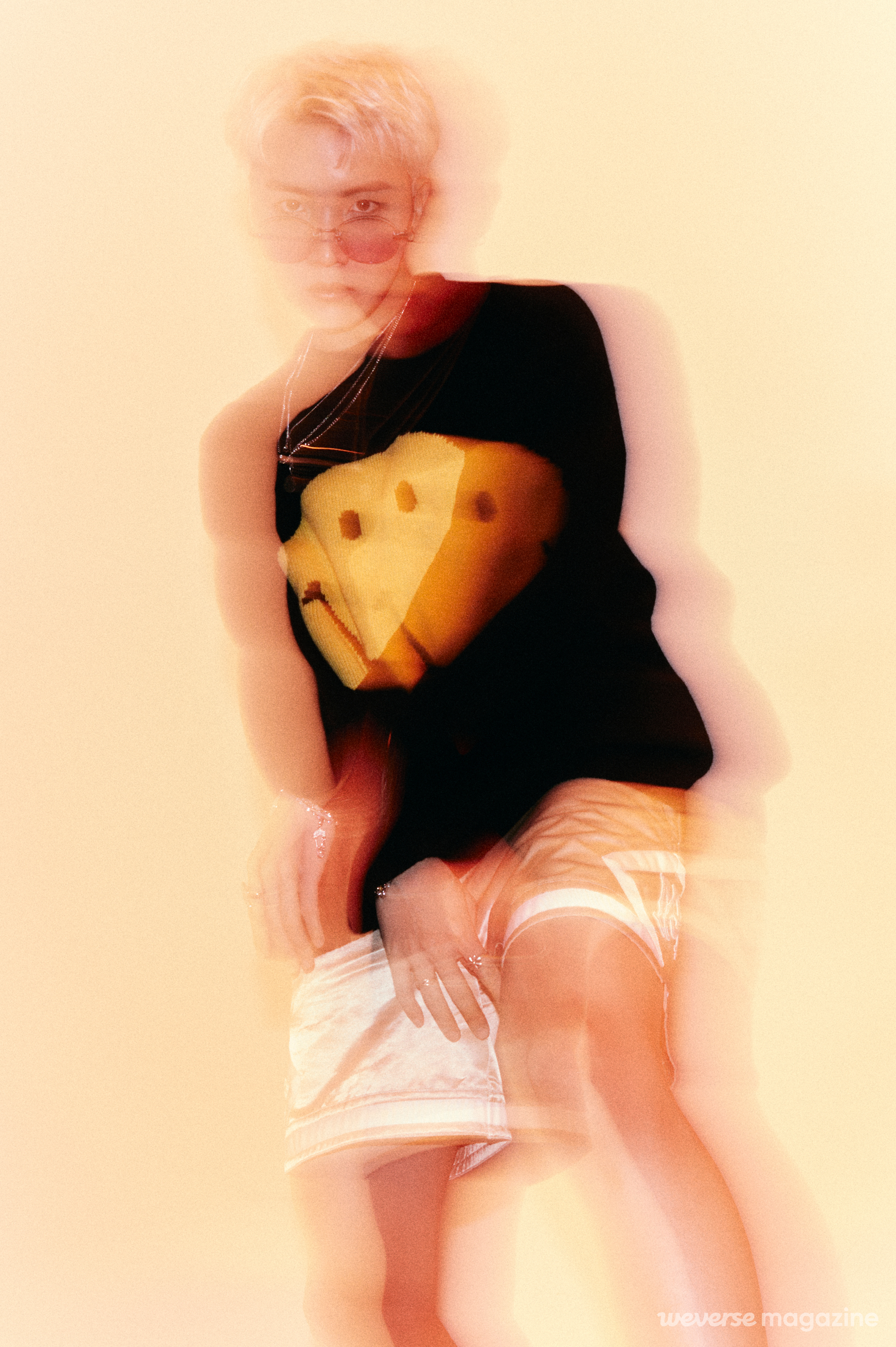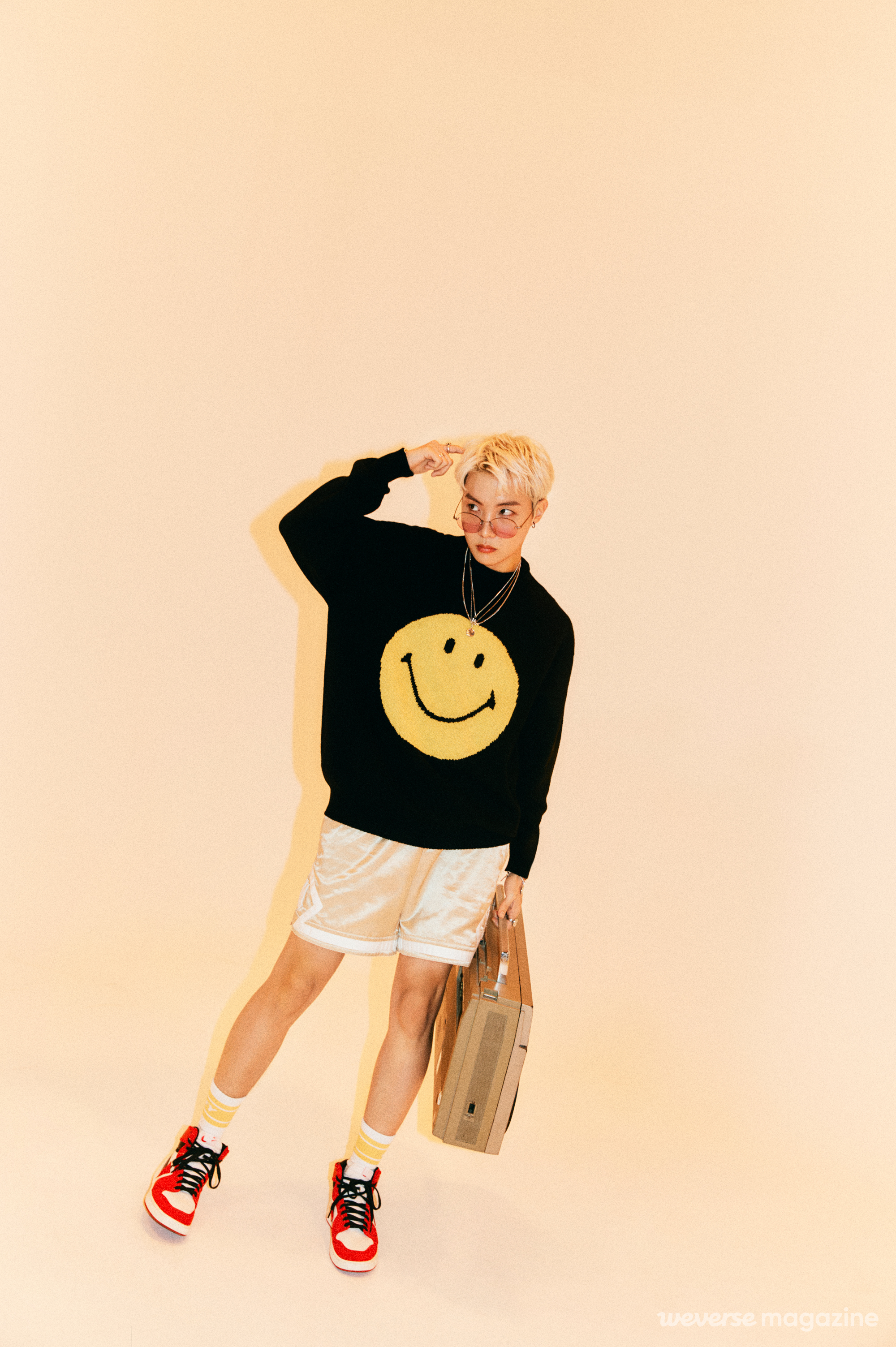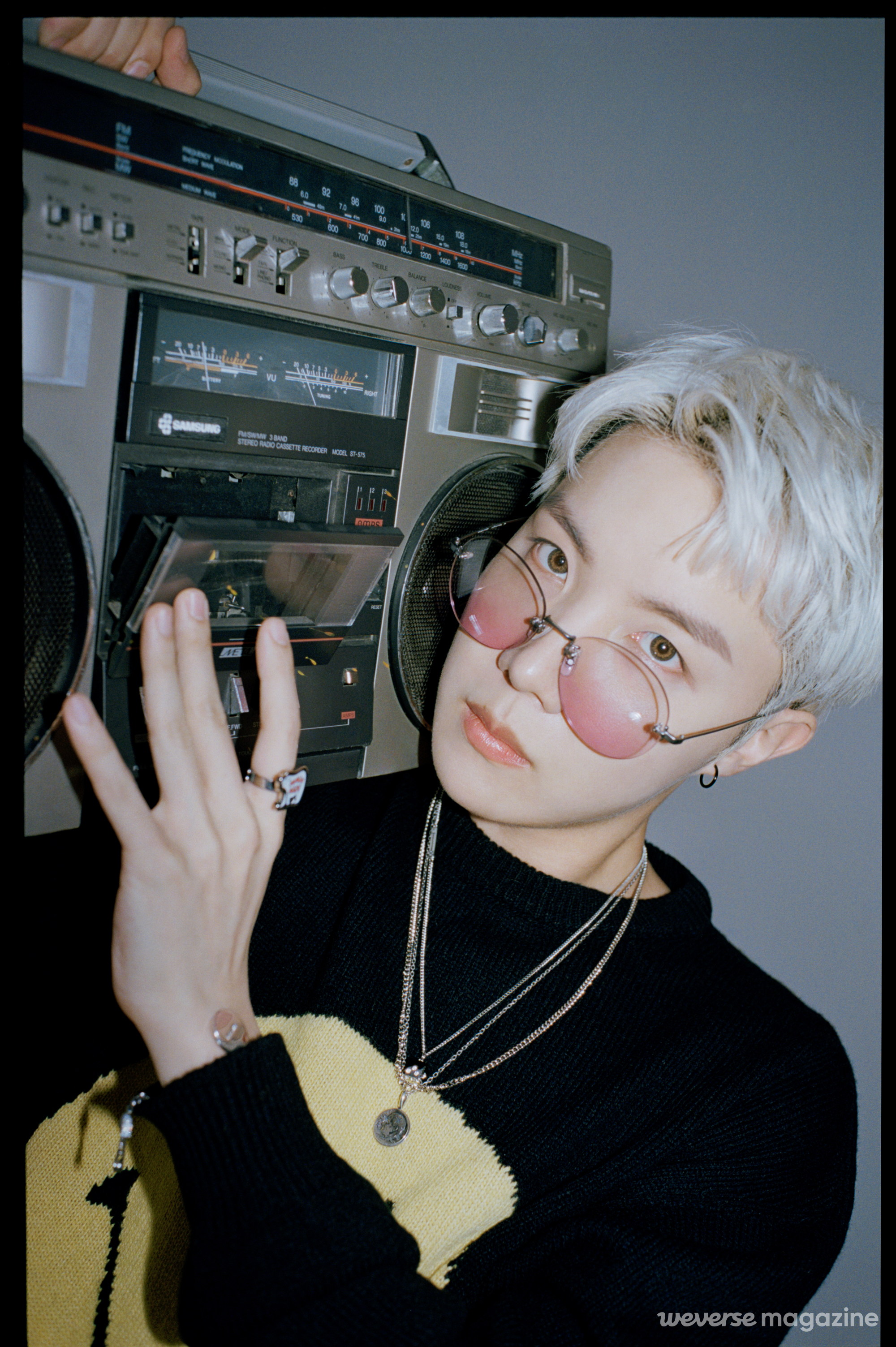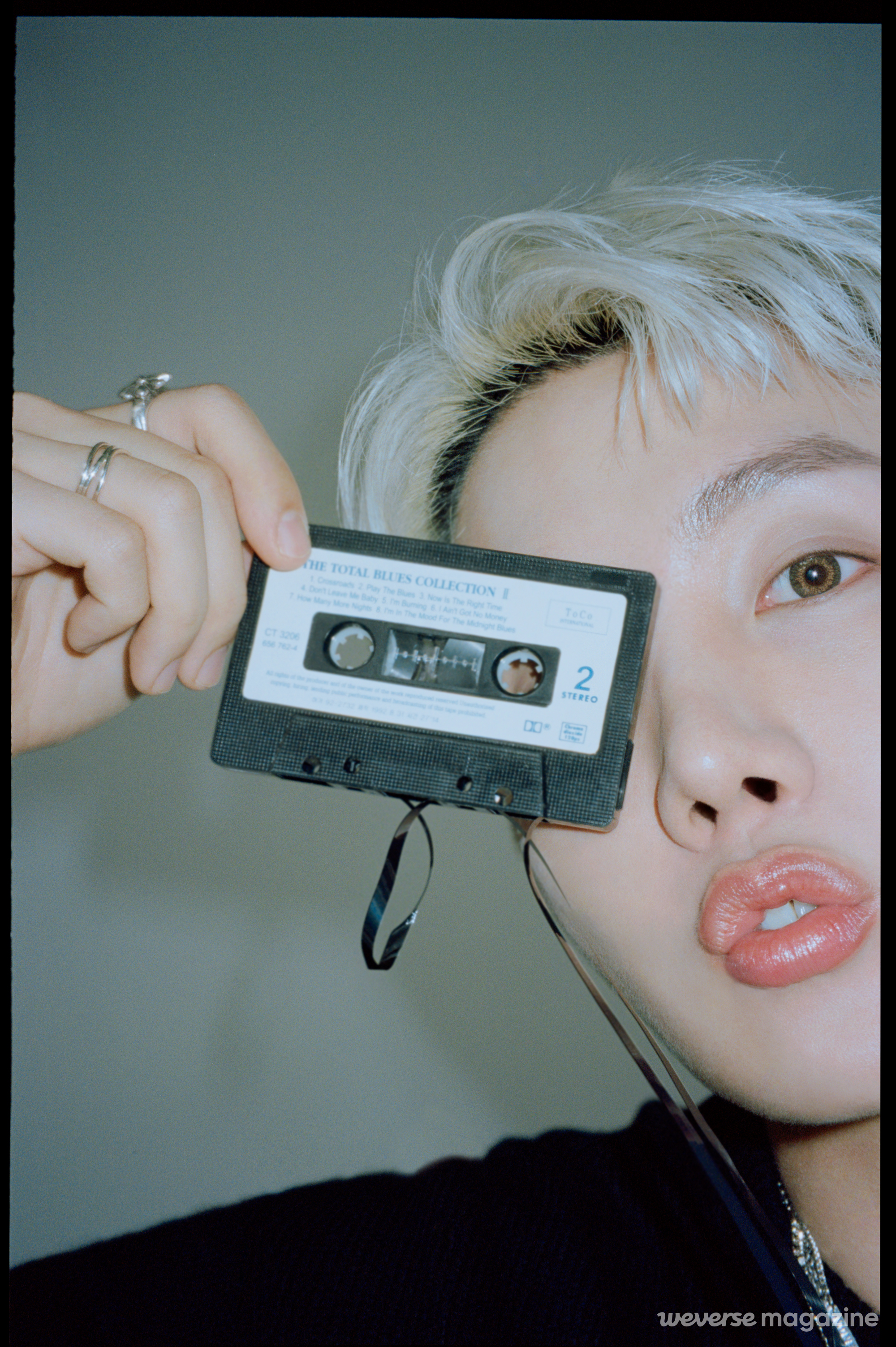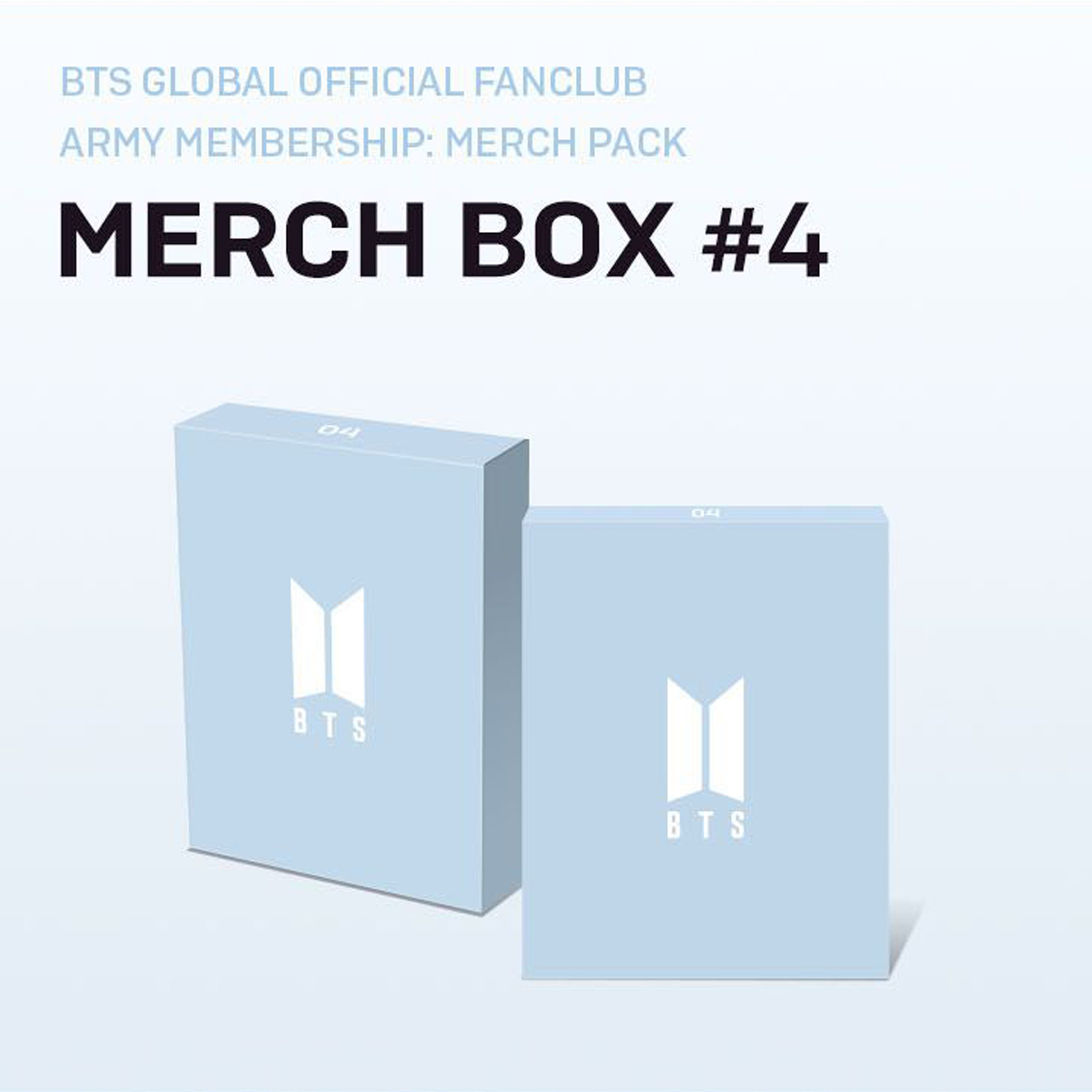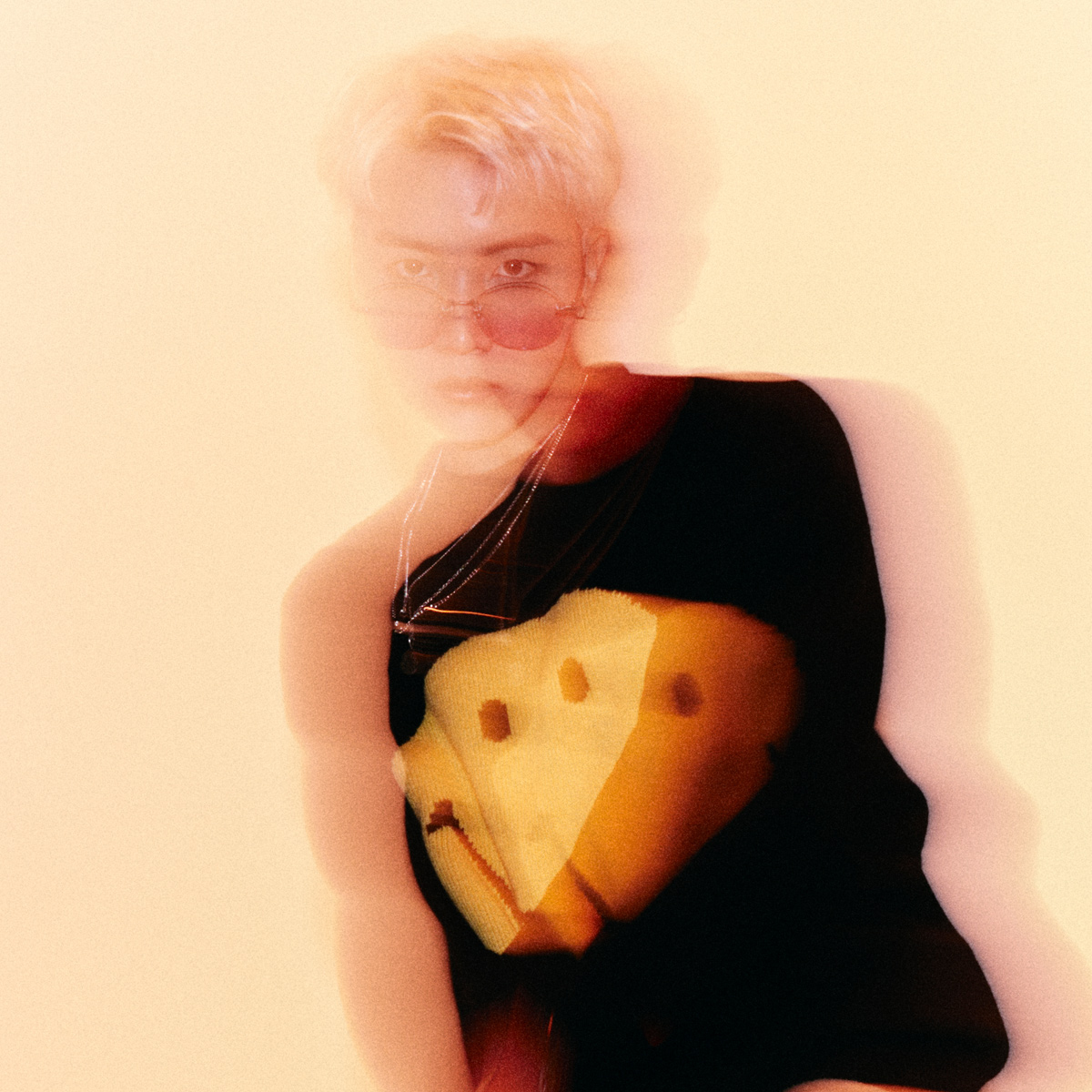
j-hope himself hasn’t changed since the days before his debut. The way he treats others, the way he feels about BTS, his passion for dancing—they haven’t gone anywhere; only their breadth has changed, along with the breadth of his deeply-held beliefs, his will, and his dreams.
“Butter” has been a huge sensation in the United States.
j-hope: I did work hard preparing for it, but whenever I try to embrace an unintended success, in my mind I’m always like … It’s like half happiness, half a feeling that makes me think seriously about what I accomplished. There’s a sense of responsibility that comes along with such an honorable achievement. ARMY’s done so much to keep us at number one, and I’m incredibly thankful for that. At the same time, I also realized that our names are becoming known to more people in the world of American pop music.
It seems like the bigger the success is, the more things you end up thinking about.
j-hope: In the past I would just humbly accept it, and it was something I worked hard for so I was happy to accept it—and that was somewhat immature, I guess, but now it’s different. I’ve been working constantly for over eight years, and it hasn’t been easy to achieve so much in that time. So from now on I’m tacking a question mark onto how I should carry on and maintain things the way they are and what attitude and stance I should have right now. It’s homework I haven’t been able to figure out yet, basically.
What effect do such thoughts have on the way you express yourself as an artist?
j-hope: I’m also a performer, and I don’t think I take any performance lightly. Ever since we did “Dynamite,” the number of times I go over my performances after they’re done has gone way up. I felt like I’m responsible for making the dances stand out, so I thought I have to try my very best for that aspect. You don’t want to underdeliver on a performance when that many people are sending out their love to you. Each and every one of the members thinks so, and I think we’ve created an atmosphere for our practices where we are able to see how important these things are. After all, even if we don’t show it to one another, we all know how important it is to practice our performances.
It seems like there must be an atmosphere of understanding in the practice studio.
j-hope: We used to have to practice for a long time, again and again, to sync up with each other. We’d practice for around 10 hours, review our performances, take a break and then get right back into it, rest some more and do it again. That was then, but now, after all that experience, each member knows where they need to focus, so we coordinate our dispositions and make intense breakthroughs and do what we need to until it’s just right, and then we take a break we really take a break. Now we don’t even really have to think about it. So it’s like, All right, let’s do everything we have to do quickly so we can hurry up and get some rest. This part doesn’t seem right though? Let’s get through this quickly. That’s how we do it. We’re more efficient about work and practice now.
Did that have an effect on you individually as well? As you think more about your performances, the parts you concentrate on might change.
j-hope: The dancing is important, but I think I came to realize just how important the visual aspect is. The reason I change my hairstyle or whatnot so often these days is because I want my appearance to blend naturally with the song. Since I’ve always been a dancer I just kept working hard at the things I could do best. But obviously it’s important not to go overboard with the visuals, so I kept an eye on it and adjusted it for each performance. That’s the most important part.
Your dancing in “Butter” is one thing, but it’s also a performance where you need to demonstrate your character. What were you hoping to show off?
j-hope: I wanted to show how much I’ve grown in “Butter.” The style is bold and revolved around well-tailored suits and the whole thing felt sexy. I tried to get that across as much as I could. And I learned a lot from watching the members who are good at expressing that. I took all the different ways I thought of that I could try out and melted them all down together, smooth like butter. (laughs)
What’s going through your mind when you’re performing, especially when the spotlight’s on you? Like when you do that attention-grabbing dance break full of slow movements in “Butter,” or the solo disco dancing you did for the “Dynamite” dance break at MMA 2020.
j-hope: My mindset doesn’t change. When the spotlight’s on me, that’s an opportunity for me, in a way. It’s a chance for me to shine among our team and its seven amazing members, so I’m always on the lookout to make good use of such opportunities by doing my best. I shouldn’t turn down what I’ve got coming to me, and show off everything I’ve got to show. ARMY and the general public will be the judges, and if they have something to say about it, I have to accept and correct it, I think. I want to say that I developed my own type of growth for myself by repeatedly correcting and practicing and correcting and practicing. I’ve been dancing a long time, but I always feel like I could be doing more, so I put in the effort and I take pleasure in when I make something that turns out really well.
But, if you look at your “Butter” fancam, you continuously react along with the other members dancing even when you’re not the focus of the main camera.
j-hope: I’m not consciously doing it. But these days when I watch overseas awards ceremonies or pop artists’ performances that they’ve shot on video, I feel like they don’t really have any heavily edited parts or quick cuts. They capture the artists’ energy while showing the whole scene, so I’m always thinking about how I never know where or how I’m going to be captured on film. So even when the camera is mainly focusing on Jin, in some cases you can still see me in the back, and so I think setting the mood in the background in order not to interfere with his part is an extremely important part of a good performance.
I thought you were very consistent. When SUGA comes forward to rap toward the end of the song, you keep tossing out little shouts to boost up the mood.
j-hope: It’s fun, you know? Doing that. (laughs)
That sounds like a good balance insofar as you can continue to express yourself individually while staying devoted to the group.
j-hope: I agree. I think that’s something I always had in the back of my head. But as I’m performing within this big group structure, making sure not to interfere with that comes before anything else.
The “Permission to Dance” performance has a different flavor than “Butter” in that sense. While “Butter” gives each member their moment to shine, “Permission to Dance” seems to place importance on the overall mood of the entire group. I feel like it brings out your personal trait of being bright and hopeful.
j-hope: When we got the song, it occurred to me that I could just be myself in this one. There’s no need to act; I can just use the real feeling I get when I’m on stage. That’s also the message the song is aiming for, so I think it came across naturally. Like I’m happy, but also on the verge of tears?
Your dance makes use of sign language. Although it is a dance, it also conveys language, so I imagine there were a lot of things to consider.
j-hope: Yes, there were. We’re conveying language even though we don’t use a lot of sign language in our dance moves. So although the song is nice and light overall, even when we were practicing we were saying how we have to make sure the moves are perfectly accurate. We thought we should understand the importance behind sign language to properly convey its significance. So we thought we should do our best to do the moves correctly while at the same time trying to fill the song with enjoyment and positive emotions. We spent quite a lot of time integrating the moves into the dance routine, and so I think we were able to show off our attitude about the performance pretty naturally.
I think your vocals and facial expressions at the start of the second verse of “Permission to Dance” help people intuitively grasp what kind of song it is. It makes me think of what you said in the “ARMY Corner Store” video uploaded to YouTube for your 2021 FESTA celebration of the group’s eighth anniversary—that you’re the “vitamins” for the group.
j-hope: And I am. I used that expression because I feel like I consistently, and unchangingly (laughs) give the team good energy. I don’t know if I’m actually the vitamins or not. Looking back, I’ve always tried to give them good energy and keep them in a good mood, and I think it’s safe to say now that I’m one of those people who try hard to keep their group’s energy up. I still get a little embarrassed, though. (laughs) I wouldn’t say that I don’t feel any pressure at all about the label. All seven of us have to act as one for BTS to work, and that’s always on my mind, so it forces me to be careful that I’m not standing out from the rest of them. Because the team functions well when everyone has their own role. And because I always keep that in mind whenever I think, I should do whatever I can do, I’m able to contribute to the team and I think I ended up feeling a little more confident about the things that I found difficult to express in the past.
Was there a push behind that change?
j-hope: I felt, and realized, exactly what I needed to do with my own personal identity and energy right after I released my first mixtape. From that point on, I thought that I should express my musical views and things like my energy regularly, but not in any intense way. Before, as time went by and the group really blew up, I think I had let go of a lot of the pressure to express myself. Then I started to feel like I wanted to try expressing myself in my own way, even as the team did well.
When you revealed your depressive side directly in the time from when you put out “Dis-ease” during the pandemic period to “Blue Side” from your mixtape, was that a reflection of that influence as well?
j-hope: People’s emotions change every day and so do their feelings and the things they can accept throughout their lives, right? So I think the changing emotions I felt and came to accept as the group grew in popularity is also expressed by the way my songs changed. It’s also something I always spend time thinking about, but I’m just another young person living his life on this planet. I’m not really different from anybody else, which means I can’t always be as bright as I was on Hope World. So that’s why I tried a different approach to the things I could express.
What did you find out after trying that?
j-hope: I ended up thinking about the shadows inside me. I didn’t realize it when we were promoting, but with the whole world suddenly at a standstill, we have all this time where we can’t do anything and I can see all the shadows underneath—sitting spaced out in the studio, thinking about what kind of life I’ve lived, seeing BTS’s performances on TV, I think, That’s who I was. The amount of willpower I found during this time has been tremendous. I figured I’d better use all those feelings entirely and all at once, that those are emotions and songs that could probably only ever be written at this time anyway, so I put all those emotions down like a diary, and “Dis-ease” was born. With “Dis-ease” as a starting point, I thought I could include stuff like my inner darkness, and that’s why I was able to release “Blue Side.”
What did you see when you looked inward?
j-hope: I ended up seeing a side to the real Jeong Hoseok’s life that I couldn’t perceive before. I kept thinking about what life would be best for j-hope while we were working, so I wondered what Jeong Hoseok’s life would look like as a whole. While that was happening I realized I’m not just some always-cheery person—I experience hardship, too. So I thought I could grow closer with listeners by sharing little parts of me that I had been hiding away, and that it would be interesting to show people a side of me that’s different from their idea of who j-hope is. Most importantly, I don’t feel any resistance about who I am right now. As a person who makes music and releases songs about his personal life, I think this is all part of the process.
There’s a line in “Blue Side” where you sing, “Now I just want to burn blue to death.” It seems here, too, something of your shadow was revealed.
j-hope: If you’re burning to death, it’d be very hot. But the parts I called blue are a place I consciously escape to to avoid things. It’s a place I escape to that I could safely live in and be swallowed up by, but I don’t want to do that. So I think I tried to show that I want to stir up my passion for the things I wanted to do even if I’m burning blue to death. To be honest with you, I don’t know how I came up with those lyrics exactly. I wrote that part a really long time ago when we were on tour overseas. I’m not a big drinker, but those were the first lyrics I ever released that I wrote while drinking. (laughs) When I write lyrics when I’m drinking I often regret them when I see them in the morning, but when I take a look at them again after some time, I can tell they’re lyrics that I could only ever write with the feelings I get at that time. When I release that kind of song, I get some kind of feeling. And when I give myself feedback about my own music, a version of myself who’s different from the way I was before I made the music emerges.
Is there anything else you’ve learned about yourself lately?
j-hope: Um … I’m—what should I say—not the kind of person to settle for their life as it is. I could just keep living like I am and do whatever I want with my life, but I don’t know, honestly. I’ve already had so many amazing things happen but I want to take things one step further, as an individual and as a member of BTS. A thought came to me one day: Have I been challenging myself at all lately? Outside of making songs or dancing? But the answer was no. So I decided I would challenge myself and give some things a try, one of which was studying English. It’s still hard and I have a long way to go, but I’m trying my best given our current schedule.
What are you getting out of studying English, do you think?
j-hope: If I can speak in English then I can give and take directions with English-speaking artists myself when I’m working on music. My thinking is that this is one channel of communication I can open that will open up more possibilities in my life. But it could end up being hard to keep studying with our current schedule (laughs) so even though I say I’ll do it, I might not be able to. Your mind could change at any minute and you could come to different decisions any time, depending on how you want to live your life. Right now I’m trying to do music for music’s sake, challenge myself with performances for performance’s sake, and try hard personally for BTS. And I’m working hard to figure out what I need to do for my next steps.
What do you imagine your next step will be?
j-hope: I think my next step personally is to grow our music globally. I’ve been doing some self-reflection lately and there’s plenty that I want to do. I have a lot of dreams, too. Making it this far with the group, seeing the other pop artists we’ve been vying with on the Billboard chart, really left an impression on me, and now I’m more serious about wanting to express something. So for example, I’m dreaming of growing our music globally since the environment to have good synergy with foreign artists has already been built.
You, and BTS too, have worked your way up step by step and now you’re able to dream up new steps. In the 2021 FESTA “ARMY Corner Store” video, you said the present is possible only because BTS followed the path that it did since its debut song, so you didn’t want to alter any of your past. (laughs) Still, is there anything you’d want to say to your past self if you could say just one thing?
j-hope: As a joke, I’d say, Hey, listen to this melody: “smooth like butter”—write that. If you do that, you’ll be number one on Billboard. I could do it that way, right? (laughs) But for me, even the parts of my life that weren’t good became opportunities for growth. So rather than telling my past self to fix something, I’d just tell him to believe in himself and move on with his life however he feels like, and keep working hard, keeping things the way they are. Other than that, I’d have nothing to say to him.
So how do you feel about ARMY now that they’ve climbed all those steps with BTS?
j-hope: ARMY is absolutely … I feel like they’ve become an icon themselves. I’m so proud of them. They’re amazing. ARMY is like an artist in itself now, too. Sort of like they’re one big symbol of the era? ARMY is as famous as BTS now. I think we give each other good energy, and helped each other to make something good. It might sound obvious coming from a member of BTS, but if I were ARMY, I’d never be ashamed to call myself a fan of BTS. Anyway, I’m seriously … I want them to always know I’m really, really grateful for them.
Unauthorized reproduction and distribution prohibited.
